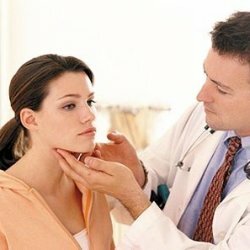How much iodine is needed for a person: signs, effects and prevention of iodine deficiency
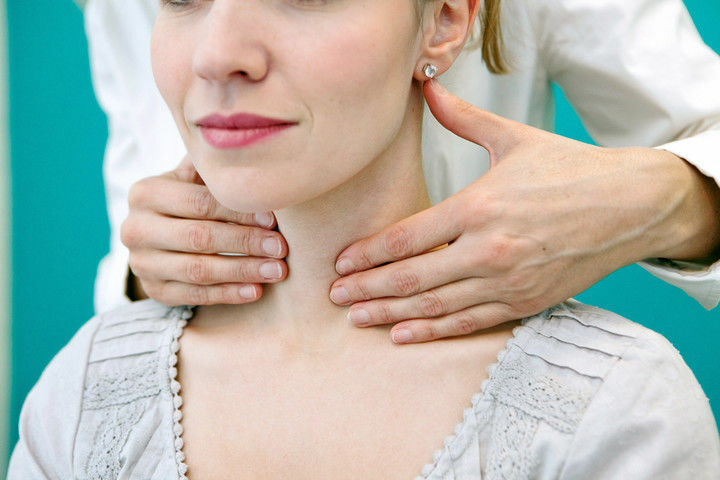 The benefits of iodine for a person are spoken by doctors and scientists around the world.It has been scientifically proven that a deficiency of this element can lead to serious disruptions in the work of a number of systems of the human body.The danger of iodine deficiency also lies in the fact that unlike, for example, iron deficiency anemia, this pathology at the initial stage is practically not manifested.However, the negative consequences of iodine deficiency are very noticeable, especially when it comes to pre-school and school-age children, as well as pregnant women.How much iodine a person needs to eat per day, which first signs of iodine deficiency should alert you and in what products does the 53rd element of Mendeleyev's table contain for us?Let's try to understand.
The benefits of iodine for a person are spoken by doctors and scientists around the world.It has been scientifically proven that a deficiency of this element can lead to serious disruptions in the work of a number of systems of the human body.The danger of iodine deficiency also lies in the fact that unlike, for example, iron deficiency anemia, this pathology at the initial stage is practically not manifested.However, the negative consequences of iodine deficiency are very noticeable, especially when it comes to pre-school and school-age children, as well as pregnant women.How much iodine a person needs to eat per day, which first signs of iodine deficiency should alert you and in what products does the 53rd element of Mendeleyev's table contain for us?Let's try to understand.
Biological role of iodine
As a microelement iodine is present in all living organisms, in animals and humans this element is a part of thyroid hormones produced by the thyroid gland( thyroxine T4 and triiodothyronine T3).Normally, the body of an adult contains about 12-20 mg of iodine( depending on body weight).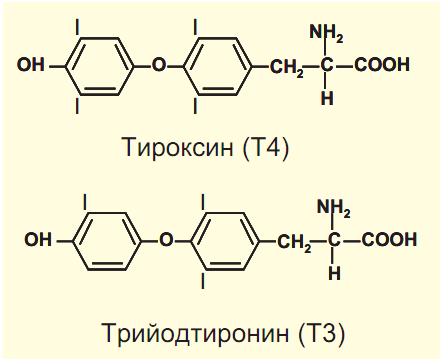 Note: daily requirement for iodine depends on the age, body weight and physiological state of the human body.In addition, it is important to take into account the region of residence.It is proved that among people living on the coasts of the seas and oceans, iodine deficiency is diagnosed extremely rarely. The thyroxine molecule contains 4 iodine atoms - this hormone is produced in the thyroid gland and is a kind of depot of its hormones.In peripheral tissues, thyroxin is converted to triiodothyronine( 1 molecule of T3 contains 3 iodine atoms).It is triiodothyronine that affects virtually all organs and systems of man.This hormone, like T4, can also be produced in the thyroid gland, but for normal production of both T3 and T4, the body must receive a sufficient amount of iodine alimentary( with food).During the day, the thyroid gland of a person with sufficient amount of iodine coming from outside can produce about 90-110 μg of T4 and only 5-10 μg of T3.With insufficient intake of iodine, the body has to compensate for the deficit by rebuilding the system "hypothalamus-hypophysis-thyroid gland".As a result, the synthesis of tiroliberin and thyrotropic hormone( TSH) is increasing, and the thyroid gland begins to actively develop thyroid hormones.Unfortunately, this process is accompanied by very negative consequences: excessive stimulation of TTG provokes the growth of thyroid cells - the human endemic goiter develops.
Note: daily requirement for iodine depends on the age, body weight and physiological state of the human body.In addition, it is important to take into account the region of residence.It is proved that among people living on the coasts of the seas and oceans, iodine deficiency is diagnosed extremely rarely. The thyroxine molecule contains 4 iodine atoms - this hormone is produced in the thyroid gland and is a kind of depot of its hormones.In peripheral tissues, thyroxin is converted to triiodothyronine( 1 molecule of T3 contains 3 iodine atoms).It is triiodothyronine that affects virtually all organs and systems of man.This hormone, like T4, can also be produced in the thyroid gland, but for normal production of both T3 and T4, the body must receive a sufficient amount of iodine alimentary( with food).During the day, the thyroid gland of a person with sufficient amount of iodine coming from outside can produce about 90-110 μg of T4 and only 5-10 μg of T3.With insufficient intake of iodine, the body has to compensate for the deficit by rebuilding the system "hypothalamus-hypophysis-thyroid gland".As a result, the synthesis of tiroliberin and thyrotropic hormone( TSH) is increasing, and the thyroid gland begins to actively develop thyroid hormones.Unfortunately, this process is accompanied by very negative consequences: excessive stimulation of TTG provokes the growth of thyroid cells - the human endemic goiter develops.
Consequences of iodine deficiency
The term "iodine deficiency disorders" was introduced by the World Health Organization in 1983, and in 1990 a special International Council for the Control of Iodine Deficiency Diseases was established with WHO.According to WHO experts in 2007, about one third of the world population( about 2 billion inhabitants) consumed iodine in insufficient quantities, 1/3 of them were school-age children.With the risk of iodine deficiency, 38 million children are born each year.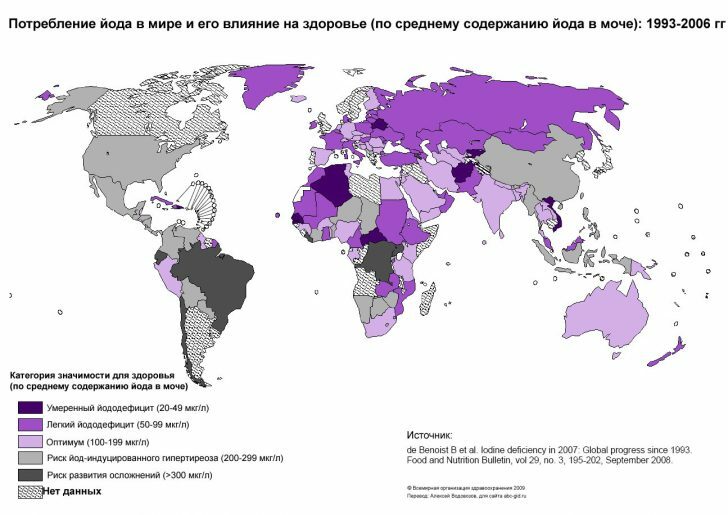 In addition to endemic goiter( diffuse uniform increase in the volume of the entire thyroid gland, or individual nodal formations), iodine deficiency in the body also contributes to :
In addition to endemic goiter( diffuse uniform increase in the volume of the entire thyroid gland, or individual nodal formations), iodine deficiency in the body also contributes to :
- Decreased thyroid function( hypothyroidism) [i];
- development of mental retardation( cretinism) in children;
- slowing the mental, physical and sexual development of children and adolescents;
- increase the risks of female infertility, miscarriage and the birth of stillbirth [ii];
- for the formation of congenital pathologies in children of mothers suffering from iodine deficiency [iii];
- increases infant mortality.
First signs of iodine deficiency
Unfortunately, as mentioned earlier, the first symptoms of iodine deficiency are very blurred.To As a rule, people complain about:
- Frequent headaches;
- is nervousness and irritability;
- fatigue, fatigue;
- a depressed mood;
- memory degradation;
- weakening of intelligence;
- skin peeling;
- irregularity of menstruation in women;
- apathy.
Secondary signs of iodine deficiency in the body are more noticeable: a person's blood pressure rises and hemoglobin level decreases( this can be seen from the general blood test).
The need for iodine in pregnancy and in children
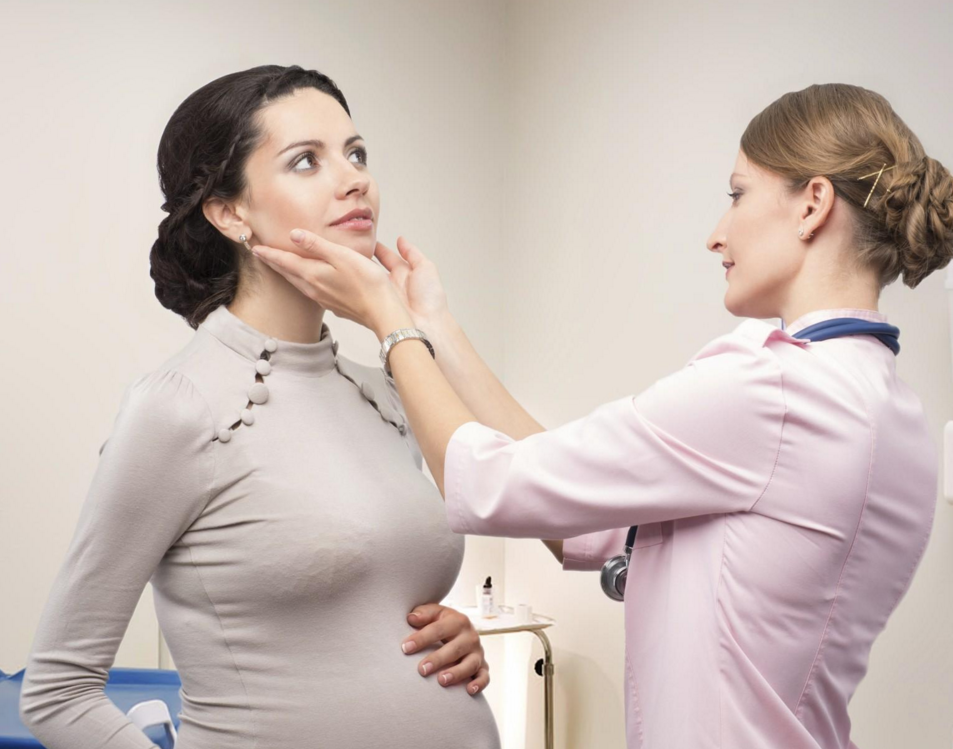 Scientists have shown that the fetus needs an adequate level of thyroid hormones throughout the period of intrauterine development.However, the key is the period from the 1st to the 12th week of embryo development: during this time the placenta is only formed, therefore, the fetus is completely dependent on the mother.If the pregnant woman does not use iodine preparations, seafood and iodized salt, iodine deficiency in her body can negatively affect the development of the fetal nervous system.Studies conducted by Chinese scientists have shown that the average indicators of mental development in the regions with iodine deficiency are on average 10-15% lower than without [iv].To understand the value of iodine for children, we quote from the international Convention on the Rights of the Child: "Every pregnant woman has the right to adequate intake of iodine to ensure the normal mental development of her child.Every child has the right to adequate supply of iodine to ensure normal development. "
Scientists have shown that the fetus needs an adequate level of thyroid hormones throughout the period of intrauterine development.However, the key is the period from the 1st to the 12th week of embryo development: during this time the placenta is only formed, therefore, the fetus is completely dependent on the mother.If the pregnant woman does not use iodine preparations, seafood and iodized salt, iodine deficiency in her body can negatively affect the development of the fetal nervous system.Studies conducted by Chinese scientists have shown that the average indicators of mental development in the regions with iodine deficiency are on average 10-15% lower than without [iv].To understand the value of iodine for children, we quote from the international Convention on the Rights of the Child: "Every pregnant woman has the right to adequate intake of iodine to ensure the normal mental development of her child.Every child has the right to adequate supply of iodine to ensure normal development. "
Iodine intake guidelines recommended by WHO
According to WHO, the minimum physiological intake of iodine per day is 150-200 μg, while most of the inhabitants of the planet Earth receive only 40 to 80 μg of iodine daily.Safe, according to WHO experts, is a dose of 1000 μg of iodine.Excessive and potentially harmful was a dose of 2000 micrograms( for people aged 19 and over).At the end of 2007, the Public Health Nutrition journal published the recommendations of the WHO and UNICEF expert group on the prevention of iodine deficiency in pregnant and lactating women and children under 2 years [v].The expert group revised the recommended levels of iodine consumption towards their increase.If previously recommended to pregnant women to use 200 mcg of iodine, now the norm has been raised to 250 mcg.At the same time, iodine intake rates for children under the age of one year remained unchanged: 90 mcg.Nursing is required up to 300 micrograms of iodine per day.In addition, such a concept as "more than adequate level of iodine intake" was introduced - this is a threshold beyond which additional doses of iodine will not give a positive effect.For pregnant women "more than adequate level of iodine intake" - 500 mcg, for children of the first years of life - 180 mcg. daily requirement of iodine according to WHO:
| age period | need for iodine |
| Children under one year | 90 mcg |
| Children 2-6 years | 110 -130 mcg |
| Children 7-12 years | 130 - 150 mcg |
| Adolescents and adults | 150 - 200 mcg |
| Pregnant and lactating women | 250 - 300 mcg |
Methods of preventing iodine deficiency
 Oz offers the development of iodine deficiency prevention programs to take into account the country belonging to one of 3 groups( depending on the volume of households use iodized salt).For example, in Azerbaijan, Armenia, Georgia, Kazakhstan and Turkmenistan, about 90% of households use iodized salt.In Belarus, Moldova, Uzbekistan, Kyrgyzstan, Tajikistan - from 50 to 90%.In Russia and Ukraine, only 20-50% of households use iodine-fortified salt( these are the countries of the third group).For the population of countries 2 and 3 groups, experts recommend taking iodine orally in the form of special preparations. The following preparations are widely represented on the Russian pharmaceutical market:
Oz offers the development of iodine deficiency prevention programs to take into account the country belonging to one of 3 groups( depending on the volume of households use iodized salt).For example, in Azerbaijan, Armenia, Georgia, Kazakhstan and Turkmenistan, about 90% of households use iodized salt.In Belarus, Moldova, Uzbekistan, Kyrgyzstan, Tajikistan - from 50 to 90%.In Russia and Ukraine, only 20-50% of households use iodine-fortified salt( these are the countries of the third group).For the population of countries 2 and 3 groups, experts recommend taking iodine orally in the form of special preparations. The following preparations are widely represented on the Russian pharmaceutical market:
- "Microroyid" for 100 μg;
- "Iodine balance" of 100 and 200 μg;
- "Nycomed";
- "Iodomarin-100", "Iodomarin-200".
Important : people with diagnosed thyroid abnormalities before starting any medication containing iodine should consult their doctor.In some cases, individual iodine intolerance may develop. In addition, consider that the shortage of iodine can be replenished, using iodized salt and seafood. The list of products rich in iodine is shown in the picture: 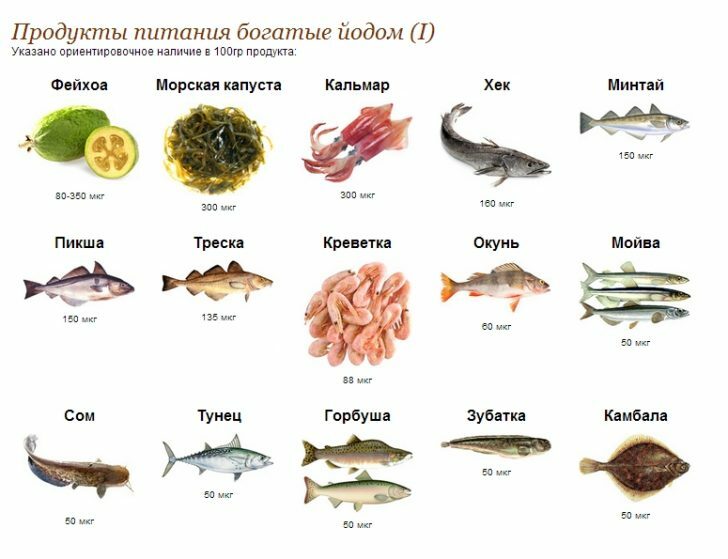
Is there an excess of iodine in the body?
When iodine is used in a dose exceeding 2000 μg( for an adult), symptoms of an excess of this trace element may appear. Symptoms of excess iodine in the body include:
- Insomnia;
- heart palpitations;
- metallic taste in the mouth;
- Increased body temperature - subfebrile;
- Weakness.
Note: cases of overabundance of iodine in the body are recorded very rarely, becauseAbout 90% of the iodine entering the body is quickly excreted in the urine through the kidneys. How to properly take iodine in a video review will tell Dr. Komarovsky:
Evtushenko Oleg, endocrinologist [i] Fadeev VA, Melnichenko GA A. Hypothyroidism: Hand.For doctors.Moscow: RCI Sovero Press, 2004. P. 288. [ii] Kasatkina E. P., Shilin D. Ye., Petrova LM, et al. Role of iodine supply in neonatal adaptation of the thyroid system // Problems of Endocrinology 2001.T. 47, No. 3. P. 10-15.[Iii] Agekin VA, Artamonov RG Dysfunction of the thyroid gland in newborns and infants born to mothers with thyroid gland diseases.pediatrician.Journal.2000. № 5. P.60-63.[Iv] Dedov I.I., Sviridenko I.Yu.Strategy of Elimination of iodine Deficiency Diseases in the Russian Federation // Problems of Endocrinology 2001. T. 47, No. 6. P. 3-12.[V] Editorial: reaching optimal iodine nutrition in pregnant and lactating women and young children: programmatic recommendations / Eds.J. Untoro, N. Managasaryan, B. de Benoist, I. DantonHill // Public Health Nutrition.2007. V. 10, No. 12A.P. 1527-1529.


